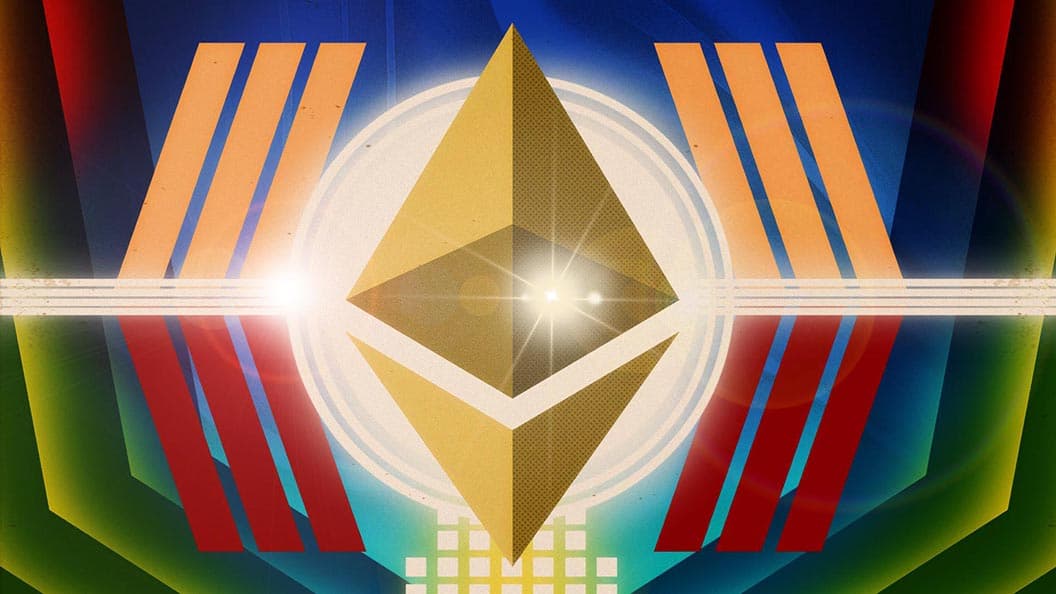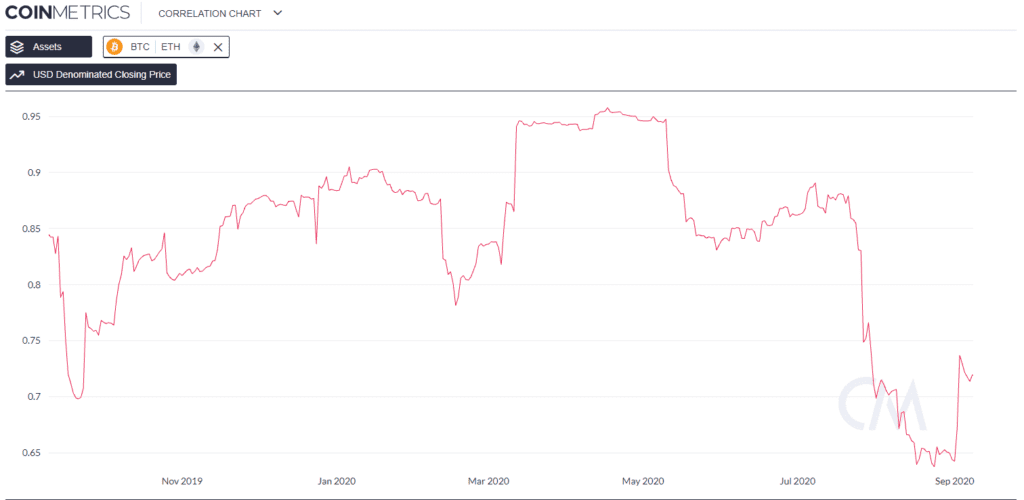Ethereum: More Than Just a Currency
Bill Noble, Chief Technical Analyst at Token Metrics, told Blockworks that ETH is like a currency and a tech stock, all in one instrument.

Blockworks exclusive art by Axel Rangel
- While bitcoin’s sheer size as an asset will move markets because of its weight, the market is now beginning to realize its a different asset entirely to ether
- Before the DeFi boom kicked off in mid-2020, bitcoin and ether moved with a correlation of approximately 94%. Now that number is closer to 60%
As 2019 closed and 2020 began, it’d be safe to say that the majority of digital asset traders had a portfolio containing bitcoin (BTC), ethereum (ETH) and a scattering of altcoins.
But back then, decentralized finance, or DeFi, was hardly the giant it is today. According to DeFi pulse, there was only about $650 million locked in value within DeFi protocols. Today, that number is closer to $70 billion — which would rank it as a top-50 bank in the United States.
And at the center of DeFi is Ethereum, the programmable blockchain that’s called by its creators the “world’s computer.” And as such, the price of ether has broken through records-upon-records as its utility becomes the hottest commodity on the market powering this FinTech revolution.
“Ethereum is both a currency and a technology platform for developing other cryptocurrencies and an entirely new banking system,” Bill Noble, Chief Technical Analyst at Token Metrics, said to Blockworks. “That makes Ethereum a better store of value than bitcoin. Ether is like a currency and a tech stock, all in one instrument. Bitcoin is just a currency.”
Blazing its own trail
Although bitcoin’s market cap far surpasses that of Ethereum, investors and analysts have begun to take note of the declining correlation between the two. What began last year at close to 94% is now just over 60%. Bitcoin’s weight as ‘digital gold’ is commanding, but Etherum’s emergence as a digital utility not digital gold is letting it blaze its own trail.

“I think people are starting to recognize that bitcoin and ether are two different things. If anyone wants to use the Ethereum network, they need gas, and it’s a great analogy for what ether is, lubricant to move tokens, it’s the currency used to incentivize validators to execute a transaction,” said Justin Chuh, a trader with regulated digital assets firm Wave Financial, told Blockworks. “To do almost anything DeFi or NFT related, someone needs to own and pay in ether, so simply the demand for gas is driving the price of ether up.”
Gas, paid back to nodes as a fee for validating transactions, is a lucrative proposition for nodes on the network.
In the last month, the top-25 protocols on the network sent a combined $6.5 million to nodes according to data tracker ETH Gas Station. The average transaction fee on the network is just under $13, according to YCharts, giving the network in its entirety a value of $20 million a day with its 1.5 million daily transactions.
According to data Blockchain Center, ethereum — with its lower market cap but programmable utility — has already surpassed bitcoin in terms of transaction volume, transaction count, and total transaction fees in what they call the “flippening” a measure of the progress ethereum is making at overtaking bitcoin. Right now, Blockchain Center says it’s 38.5% of the way there.
For Chuh, this isn’t surprising. Digital gold sits in a vault; ether needs to be widely used to transact in the DeFi economy.
“I’m definitely looking at ether as a commodity, it’s a standard resource that is of the same quality everywhere. Whether someone is lending in Nigeria, borrowing in the US, using a DEX in India, or sending NFTs across the world, ether is used and accepted as payment,” he said.
Good competition
Other development teams have taken note of the possible value capture here through fees. In the last six months other smart contract platforms have emerged like Cardano, Polkadot, and Solana.
On a recent Blockworks webinar panelists were cool to the idea that Ethereum’s days were numbered, arguing that it’s not a winner-take-all world.
“You have vertical specialists and alternatives that are not taking a share, but instead creating alternative products and a lot of nice business,” John Wu, president of Ava Labs, said during the webinar, emphasizing interoperability.
Ethereum, with its divergence from bitcoin and rising market cap, isn’t about to be taken out by a competitor.
“In crypto, there will be more than one blockchain that runs apps like Ethereum. Competition from other blockchains is forcing protocols that run on Ethereum to innovate at a rapid pace. Competition is good, as it will keep making Ethereum better and better as an investment,” Noble said.
Where does the future lie?
As the transition to ETH 2.0 comes closer, what’s going to happen to Ether? Will it continue to diverge from bitcoin? Or will it level off?
In a late 2020 report on the topic, digital asset research firm Messari predicted the emergence of what it called the “asset superclass triangle” with the introduction of ETH 2 potentially causing it to move on the value of its fundamentals — programmability — instead of being dragged along by bitcoin.
“[ETH 2] will provide ETH with an unprecedented combination of attributes from each of the three asset superclasses: capital assets, commodities, and stores of value, respectively. And it may also create a constant tug of war for ETH demanded by each use case,” Messari wrote.
Messari noted that bitcoin only has two of those values: a store of value and a commodity.
Token Metrics’ Noble has a simpler analogy.
“Bitcoin is like your first car. You’re really excited when you first get it, but you’re even more excited when you can get rid of it and get something cooler,” he said. “Ethereum’s market will exceed the market cap of bitcoin. The future of corporate finance and Wall Street is going to run on Ethereum.”
“Ethereum will be a household name by the end of the year.”






